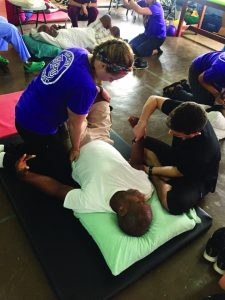Students provide care to rural Jamaican community

Alexandria Nickles (left), a third-year doctoral PT student helps stroke patient with range of motion exercises. Photo by Highpoint.edu
By Nicholas Bainbridge
Editor in Chief
The island nation of Jamaica was visited this summer by a group of High Point University students and staff. Dr. Renee Hamel, an assistant professor for the Congdon School of Health and Sciences, brought some of her physical therapy students with her to provide care for residents of St. Elizabeth, Jamaica.
Dr. Hamel and her team partnered with For U, a nonprofit organization focused on healing people in rural regions. The decision to work in Jamaica was partially that of For U, but the HPU students also wanted to work there to help those in the region who normally would not have access to such care unless they were wealthy.
“We wanted to make a difference in a place that truly needed it,” said Hope Caddell, one of the students who participated in the service trip. “We wanted to create a partnership with an organization like For U that would continue to invest in patients. We all had a heart for patients with neuro conditions that are so extensive that oftentimes they do not receive the full and proper care necessary to fully rehabilitate from their conditions. This is especially true for the patients in Jamaica who had no way to afford care like this without these camps.”
The 10-day trip served a dual purpose for HPU. Not only did it have the objective of helping those in need, but it also offered students the opportunity to develop their skills in the field.
Students worked with real patients suffering from conditions like spinal injuries and helped rehabilitate those who have suffered from strokes. Because these were real patients rather than models on a screen, there was more importance on the work and a heightened ability for students to learn.
Adept clinicians in the field served as mentors for the students, ensuring that they had the supervision they needed to provide high quality treatment to their patients. These instructors left an impact on the students by showing them how to conduct detailed procedures.
“This was a life changing experience,” explained Caddell. “We were able to treat patients more extensively than we have ever had the opportunity to before. We were with these patients eight hours a day for a week and a half and were treating alongside amazing, inspiring clinicians that taught us more than we could have ever learned in a classroom.”
The location and facility also had an impact on the quality of the learning experience. Due to their work being done in a rural region, the resources at their disposal were not infinite and treatment tactics sometimes required outside-of-the-box thinking.
Additionally, there were many variables within the cases that students treated that needed to be accounted for, furthering the need for them to be adept at problem solving. “The camp provided an opportunity to work with higher complexity patients and encouraged creativity with treatments using the resources available,” commented Emily
Tower, a student who conducted physical therapy treatment during the trip. “The balance of structure and instruction to flexibility and creativity was ideal for third-year doctoral physical therapy student learning.”
The work done by HPU students helped better the lives of several people at the treatment facility. The aid was invaluable and left a positive mark on the community.
“I feel as though the impact was priceless and unable to fully measure,” said Caddell, in reference to the effect that their work had. “We changed seven people’s lives. We were able to see incredible gains in all the patients, as evidenced by improvements in their balance, strength, mobility, flexibility, neuromuscular control, cognition, spasticity, gait and ability to perform daily activities.”
This assessment of Caddell’s was supported by data obtained from the pre- and post- treatment tests. Each of the seven patients demonstrated measurable advances toward recovery after the work of the students. These improvements show the students’ developed proficiency for this kind of work and their acquiring of valuable experience that will serve them well in their future careers.
The trip served as a way to expose students to a different environment, allowing them to gain an understanding of how medical treatments can sometimes differ based on geography and available resources.
“We had the opportunity to treat patients in a different culture where needs were different and treatment principles were different,” said Caddell. “This experience will factor into my future as a physical therapist as I will always remember the things I learned and what health care is like in comparison to health care in the states.”
While the primary focus of the service was on providing medical care, students also assisted patients with other tasks. These include aiding in-home construction and renovation work, as well as running basic errands with their patients.
Student volunteers will be sent to do similar work in Guatemala next summer.